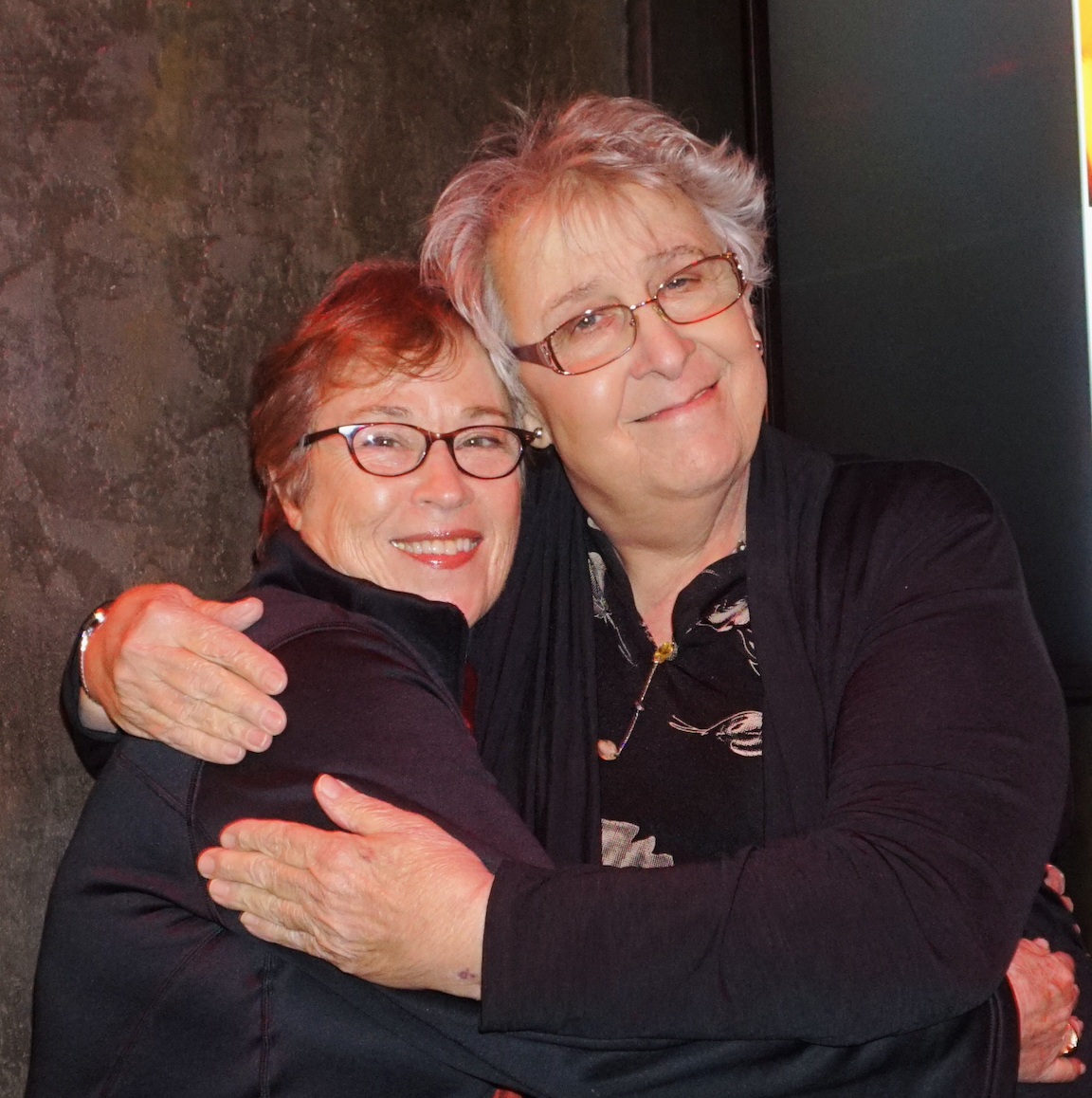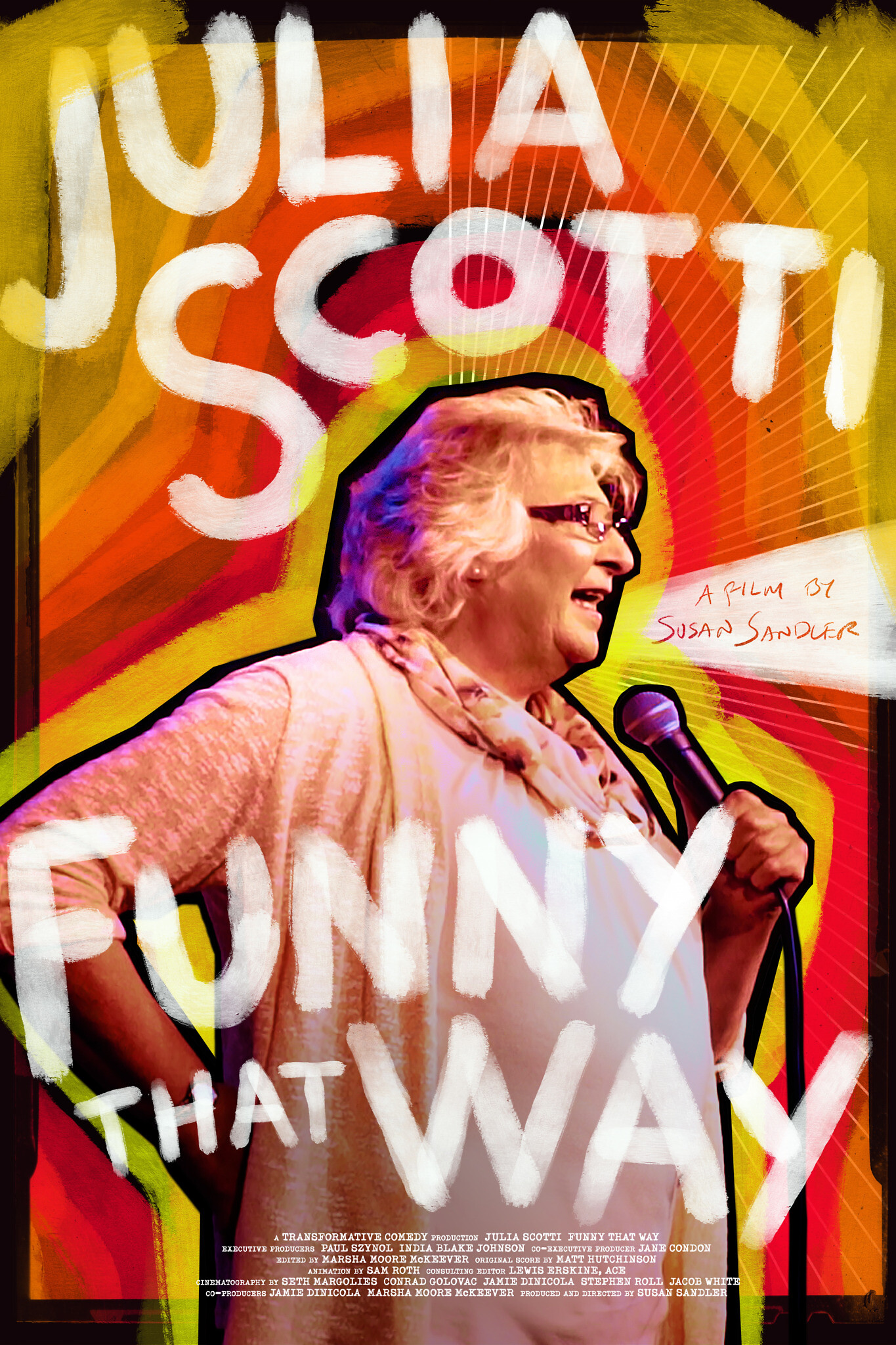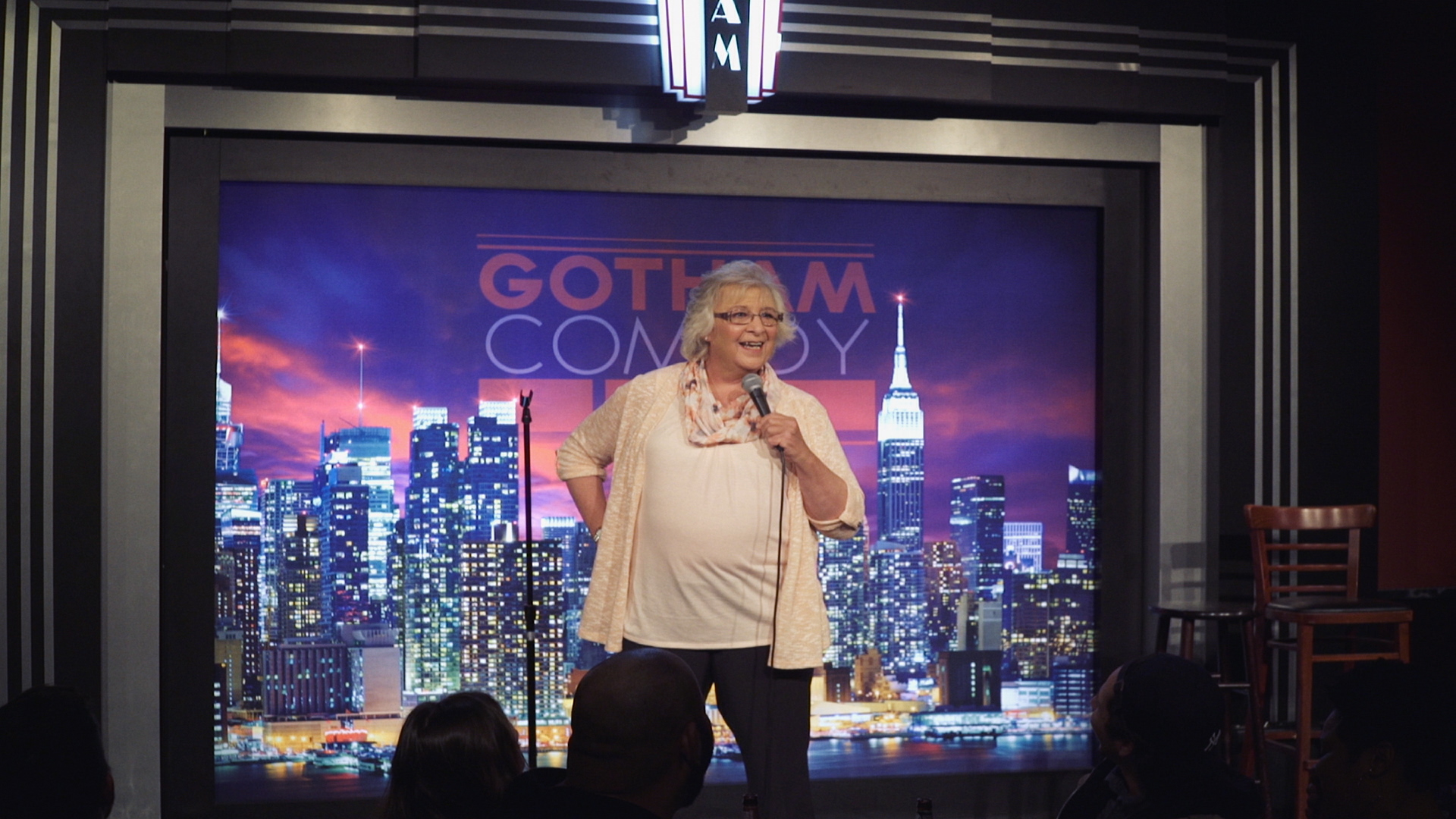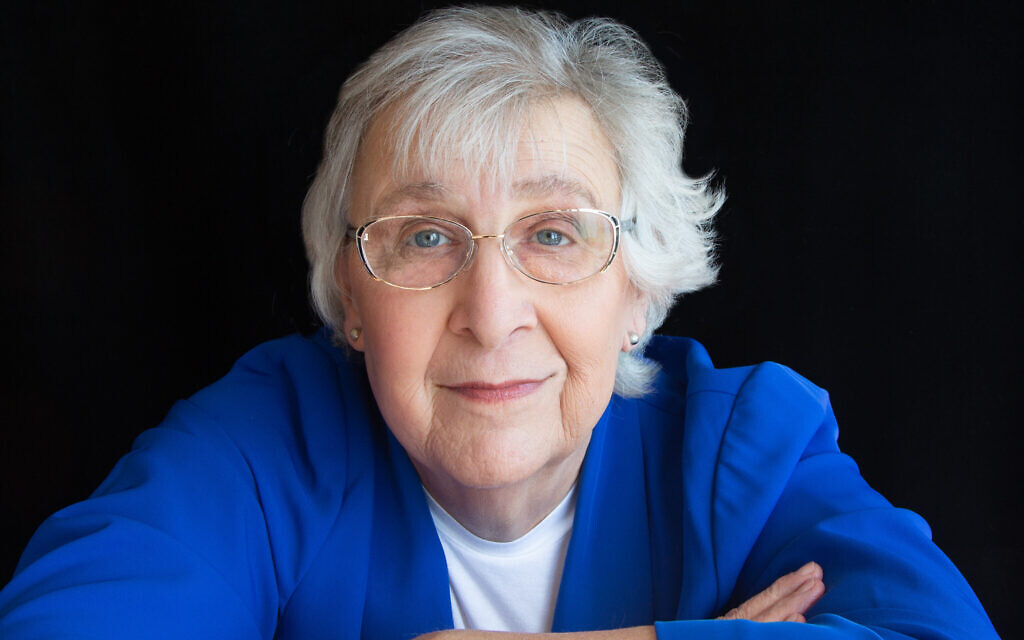Transgender comedian documentary exposes the pain behind the search for happiness
Crossing Delancey writer's latest project is close to her heart
When Susan Sandler wrote the beloved Jewish romantic comedy Crossing Delancey, she drew on her relationship with her grandmother.
“Like all grandparents, she just had this essential wish for happiness,” says Susan by Zoom from New York. “And for my Bubbeh, it was about finding someone who loved me and who would protect me, and who would be good to me.”
Happiness, and the search for it, is now also integral to her first documentary, Julia Scotti: Funny That Way. The eponymous New Jersey native used to perform stand-up as Rick Scotti and when Susan met her, at a comedy festival on the island of Nantucket, in Massachusetts, she was in the process of rebuilding her career after withdrawing from comedy for a decade, following her transition in 2000, aged 48.
Get The Jewish News Daily Edition by email and never miss our top stories Free Sign Up
“I went to see Julia’s show and I fell in love. I fell in love with the voice. I fell in love with her courage, everything about her.”

They became friends and built the trust essential to documentary making. Julia gave the director access to “intimate materials” including journals, letters, VHS recordings of old performances and home movies. “And then she let me bring the camera into every corner of her life,” says Susan.
They filmed from 2016 to 2020, during which time Julia never asked to see footage, nor held anything back. “There were no parameters. It was complete and total trust,” says Susan, who teaches screenwriting at NYU’s Tisch School of the Arts. “And the responsibility of a filmmaker to honour that trust is something I take very seriously. There was nothing I wanted to do that would harm her, or in any way cause her any pain.”
There had been enough pain in Julia’s life already. Some was her own, and some was that of her children from her second of three marriages, Emma and Dan, who were too young, at 12 and 9, to understand what was happening when their father transitioned. They became estranged for 14 years.
 When Susan started filming, “it was very fresh”, and Dan, a comedy sketch writer who seems to have inherited Julia’s funny bones, had only just begun to email and text her. “Emma was a longer road to getting back in touch,” says Susan. “We have a scene in the film where she is seeing Julia perform for the first time, and it was incredible to be able to shoot that.”
When Susan started filming, “it was very fresh”, and Dan, a comedy sketch writer who seems to have inherited Julia’s funny bones, had only just begun to email and text her. “Emma was a longer road to getting back in touch,” says Susan. “We have a scene in the film where she is seeing Julia perform for the first time, and it was incredible to be able to shoot that.”
People did not have the language to talk about gender dysphoria when Rick, who appeared on bills with Jerry Seinfeld and Chris Rick, dropped his bombshell, explains Sandler. “There was no context, culturally. No one around them had anything to point to. And the children were growing up in a very conservative community, largely Italian and Catholic. So it became a really punishing kind of identity for them, with a lot of shame.”
For years, even Rick did not understand what he was feeling. In the documentary, Julia and Dan watch a videotape – given to them cold by Susan, knowing it would be provocative – of him doing a gag about ugly men becoming ugly women with the same voice. It makes uncomfortable viewing, but Julia has enough distance now to analyse what was happening.
 “It’s clearly transphobic, and it’s not even funny, it’s just disturbing,” offers Susan. “When Julia talks about that, she’s acknowledging what a lot of trans folks and gay folks have gone through, which is recognising periods in their life when they were struggling so much that they attack themselves in the process of trying to figure out their identity. She feels bad about it, it was hurtful, but it was herself who she was hurting.”
“It’s clearly transphobic, and it’s not even funny, it’s just disturbing,” offers Susan. “When Julia talks about that, she’s acknowledging what a lot of trans folks and gay folks have gone through, which is recognising periods in their life when they were struggling so much that they attack themselves in the process of trying to figure out their identity. She feels bad about it, it was hurtful, but it was herself who she was hurting.”
As part of her new act, Julia reveals she is trans and asks if there are any trans people in the audience. Early on, there would be silence, recalls Susan. “But over time, there began to be more and more trans folks in the audience, which was, for us, a wonderful thing.”
In the background, though, is the Trump administration’s attacks on America’s trans community. Placards at a demo read ‘Love Trumps Hate’ and ‘Protect Trans Kids’. Julia does a joke about not being allowed to use women’s toilets; and Emma worries about what she faces on tour, “which is terrifying when you think of the vulnerability of a performer on stage,” says Susan.
She covers all of this with a light touch in the film, and says that when they began, “it was incidental that Julia was trans”. Her storytelling focus was always, “Julia’s journey and how her family was returning to her life. What we’ve observed over the past few years internationally, the way that transgender folks have been politicised, and everything that has happened that has made it a culture war – none of that was ever a part of the process for this film, or for Julia’s saying yes to me. There wasn’t an agenda, ever, in terms of any political agenda.”
Julia Scotti: Funny That Way is released on Prime Video Friday 31 March.

Thank you for helping to make Jewish News the leading source of news and opinion for the UK Jewish community. Today we're asking for your invaluable help to continue putting our community first in everything we do.
For as little as £5 a month you can help sustain the vital work we do in celebrating and standing up for Jewish life in Britain.
Jewish News holds our community together and keeps us connected. Like a synagogue, it’s where people turn to feel part of something bigger. It also proudly shows the rest of Britain the vibrancy and rich culture of modern Jewish life.
You can make a quick and easy one-off or monthly contribution of £5, £10, £20 or any other sum you’re comfortable with.
100% of your donation will help us continue celebrating our community, in all its dynamic diversity...
Engaging
Being a community platform means so much more than producing a newspaper and website. One of our proudest roles is media partnering with our invaluable charities to amplify the outstanding work they do to help us all.
Celebrating
There’s no shortage of oys in the world but Jewish News takes every opportunity to celebrate the joys too, through projects like Night of Heroes, 40 Under 40 and other compelling countdowns that make the community kvell with pride.
Pioneering
In the first collaboration between media outlets from different faiths, Jewish News worked with British Muslim TV and Church Times to produce a list of young activists leading the way on interfaith understanding.
Campaigning
Royal Mail issued a stamp honouring Holocaust hero Sir Nicholas Winton after a Jewish News campaign attracted more than 100,000 backers. Jewish Newsalso produces special editions of the paper highlighting pressing issues including mental health and Holocaust remembrance.
Easy access
In an age when news is readily accessible, Jewish News provides high-quality content free online and offline, removing any financial barriers to connecting people.
Voice of our community to wider society
The Jewish News team regularly appears on TV, radio and on the pages of the national press to comment on stories about the Jewish community. Easy access to the paper on the streets of London also means Jewish News provides an invaluable window into the community for the country at large.
We hope you agree all this is worth preserving.
-
By Brigit Grant
-
By Laurent Vaughan - Senior Associate (Bishop & Sewell Solicitors)
-
By Laurent Vaughan - Senior Associate (Bishop & Sewell Solicitors)
-
By Laurent Vaughan - Senior Associate (Bishop & Sewell Solicitors)
-
By Laurent Vaughan - Senior Associate (Bishop & Sewell Solicitors)






















